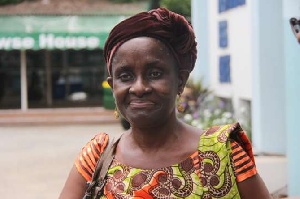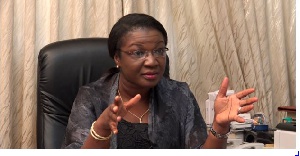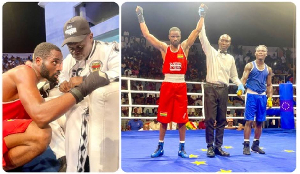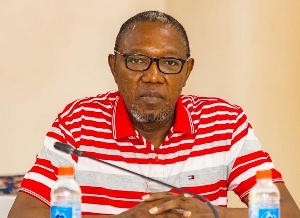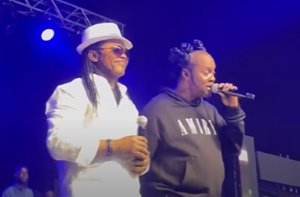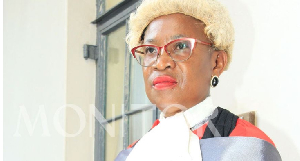Opinions of Monday, 21 August 2023
Columnist: Ajoa Yeboah-Afari
Reflections on war, hundred years or otherwise, BECE and youthful dreams
I recall that in secondary school, when we read about the Hundred Years’ War, I used to wonder if historians weren’t exaggerating. How on earth could a war last a good 100 years? I would ask myself that question many times.
But I have since seen the light! For example, a few days ago, sitting in a school assembly hall, attending my granddaughter’s Junior High School (JHS) graduation on Saturday, August 12, 2023, I had to do a re-think, about the passage of time.
It seems it was only a few days ago when on a Wednesday evening in March, 2008, I rushed from my office to a hospital’s maternity ward in Accra, to welcome the latest, eagerly awaited addition to the family, Naa Shika. And already we have marked 15 years! Here I was, witnessing her, metamorphosed into an exceptional teenager graduating from JHS, having completed the Basic Education Certificate Examination (BECE)!
So maybe the historians were not exaggerating; perhaps a war can drag on for so long a period after all, because time passes so swiftly!
Incidentally: “The Hundred Years' War (1337-1453 CE) was an intermittent conflict fought between England and France that started when king Edward III of England (1327-1377 ) squabbled with Philip VI of France (1328-1350) over feudal rights concerning Gascony and trade with the Low Countries,” historian Mark Cartwright (World History Encyclopedia).
Why does it so often seem like time is an Olympic sprinter? New Year festivities are hardly over before we’re celebrating Easter, and before you know it, we’ve passed mid-year and are careering towards Christmas!
Naa Shika aims for a future career as an architect; and I’m sure her mates, too, have similar dreams. Of course one hopes for a good future, opportunities for the youth in Ghana and other West African countries to fulfill their dreams when they complete their schooling.
Still, in these troubled, and troubling, times what are the assurances we, the adults, are giving them? Will their future, too, involve threats of war, as Naa’s class of 2023 has graduated against the backdrop of the distressing Niger situation and alarming talk of possible war against Niger by the Economic Community of West African States?
As a famous saying goes, “Older men declare war. But it is youth who must fight and die” (attributed to Herbert Hoover the 31st US President; 1929 - 1933).
Hopefully, the ongoing discussions by ECOWAS, chaired by President Bola Ahmed Tinubu of Nigeria, to restore the Government of Niger’s President Mohamed Bazoum, removed by a coup d’état, will lead to peace. But the junta has made it clear that restoration of constitutional rule which they aborted on July 26, 2023, and returning former President Bazoum to power, as being demanded by ECOWAS, is out of the question.
It has been reported that the junta, led by General Abdourahamane Tchiani, had at last met an ECOWAS delegation on August 19. Furthermore, General Tchiani has indicated that constitutional rule will be restored within three years. However, ECOWAS has reportedly rejected outright this transition programme.
ECOWAS sanctions if the junta didn’t reverse the coup, began with Nigeria cutting off electricity to Niger and closure of borders with Niger, a landlocked country of some 27 million. Predictably, the closure of borders, has affected exports and imports. Ghana-Niger onion traders are counting huge losses because truckloads of the essential vegetable are rotting at borders.
No surprise that the Niger junta have remained defiant, because it has been reported that some 80 percent of that country’s population support the overthrow of the Bazoum government.
A main outcome of the Accra meeting by ECOWAS security chiefs, on August 18 and 19, was that ECOWAS would continue to explore all diplomatic means to see Niger return to constitutional rule, but the military option, war, definitely remains as a last resort. Dr Abdel-Fatau Musah, ECOWAS Commissioner in charge of Political Affairs, Peace and Security declared.
Thus the uncertainty remains.
Of course a coup is not welcome, especially to those who have lived through one before – and experienced its consequences. But why even a threat of war? As if the madness going on in Sudan is not enough! As if Russia’s ‘might is right’ assault on Ukraine is not enough! And war, conflict of any kind, always seems to have long tentacles.
Otherwise why would a war in Ukraine have such a devastating effect, long term, on other countries, even in far-away Africa? Who needs more war?! In Ghana, emphatic ‘no war with Niger’ calls are being echoed daily, from numerous quarters, the latest coming from the Trades Union Congress.
Going by the Ukraine and Sudan unenviable examples, who knows how soon such a war with Niger would end? I doubt very much that the English and French kings knew that their war would last a good century.
TV of August 19 news showed hordes of youth in the Nigerien capital, Niamey, racing with patriotic fever and fervour to join a militia force dubbed ‘Volunteers for the Defence of Niamey’ in response to a recruitment drive to fight the ECOWAS troops should they attack Niger, as is being threatened.
Conceivably, the youth have been galvanised by the decision of the junta to end the stranglehold of France over their economy, the wicked, unjust profiting off Niger’s uranium mines at the expense of that country. Nevertheless, I don’t think that the dreams of the Nigerien youth included a crash course in how to fire guns to face opposing forces from other African countries.
Poignantly, many quotes about war highlight the inevitable toll on a country’s youth. The following are a few of the most memorable ones:
“A war is a place where young people who don’t know each other and don’t hate each other kill each other, by decision of old people who know each other, but don’t kill each other and shake hands at the end of the war.”
“War is what happens when language fails” (Margaret Atwood, Canadian poet).
“There never was a good war, or a bad peace” (Benjamin Franklin, American politician).
In an incisive article, ‘With ECOWAS, not all dictators are equal’, published on August 14, a Nigerian Tribune columnist Lasisi Olagunju, warns of the possibility of ECOWAS leaders starting a war that will be difficult to win. He concludes with this gripping question: “Why is negotiated transition back to democracy the choice for other troubled places and war the preferred choice for Niger?”
Exactly! “There never was a good war, or a bad peace,” is another way of looking at it.
One prays fervently that when the ECOWAS leaders meet for a final decision, their conclusion will not be a reflection of ‘language having failed’. Both the Tchiani-led junta and ECOWAS need to be flexible and continue talking to reach a peaceful settlement, to avoid adding to the economic and other woes of the sub-region.
The peace initiatives must not fail, if for nothing else, for the sake of the Naa Shikas, all the youth of Ghana, Niger and other West African countries. They deserve to be allowed to realise their dreams in countries that allow them to achieve their full potential in peace – and alive. War will not guarantee that.
Moreover, if the sub-region can afford to fund a war, why can’t those funds be used to relieve the countries’ cost of living crisis?
ajoayeboahafari@yahoo.com

